73 Search Results for PECS
July 7, 2015
by Carole Zangari -
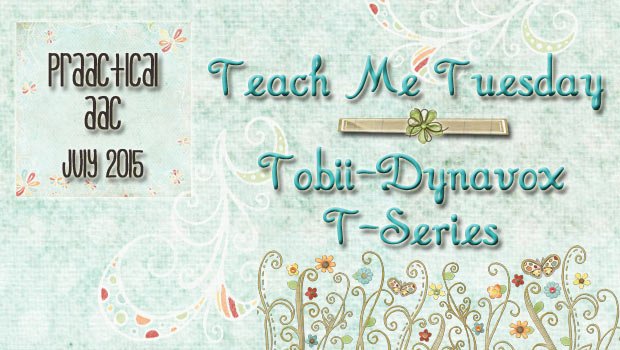
It’s another Teach Me Tuesday and today we are exploring the T-Series from Tobii Dynavox. Join us! General Information Quick Start User Guide Video Tutorials Converting Series 5 Pagesets Product Overview Technical Specs Where to go for Help: support@tobiidynavox.com
June 23, 2015
by Carole Zangari -
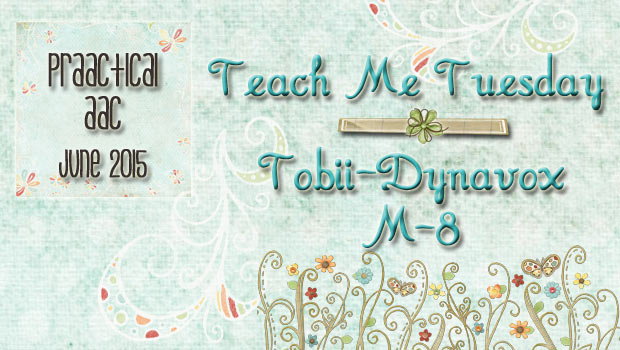
Want to learn more about the M-8 from Tobii-Dynavox? Here are some links to explore. Product Overview User Manual Video Tutorials: Getting Started Technical Specs Where to Go for Help 800/793-9927; support.na@tobiidynavox.com Knowledge Base (Select M-Series in the dropdown menu)
June 18, 2015
by Carole Zangari -
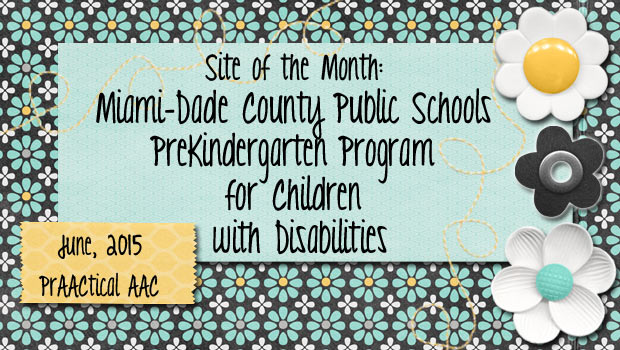
These days, there are so many wonderful websites for resources and AAC-related information that sometimes it is hard to remember where to look. When I decided to feature some of my favorite sites, I wanted to start with a site that has been helping SLPs, teachers, and families for a long time. The website for preschool special education program at Miami Dade County Public Schools has been a ‘go-to’ resources for many years. The AT team, which serves over 200 preK classrooms, has evolved over the years, but what has not changed is their commitment to helping children learn to communicate. If you work with little ones, you may want to spend some time exploring their site. Here are some of the AAC-related highlights to get you started. Implementing AAC in the Preschool Classroom Using the daily routine as a framework Motivating messages Modeling AAC Using cues and wait time Using... [Read More...]
May 5, 2015
by Carole Zangari -
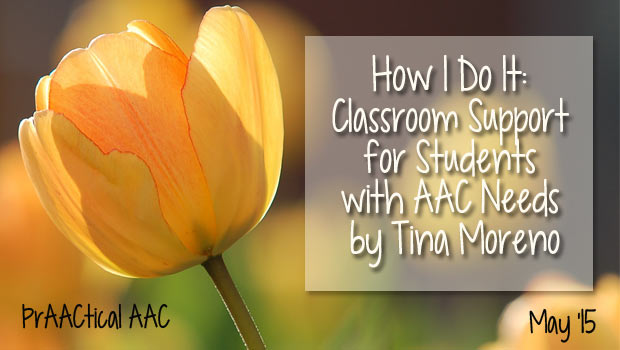
We are fortunate to have a return visit from Tina Moreno, who brings her experiences both as an SLP and also as a mom of a teenager who has used AAC for most of his life. In this post, Tina shares some of the strategies that she has used to support AAC students in their classrooms. If you are a school-based SLP, don’t miss Tina’s classroom observation form for gathering data on how AAC is being used in various activities and lessons. GIVE THEM FIVE As an SLP in the school setting, helping teachers support students in the classroom can be a big challenge. While we can see students making progress in our therapy sessions, it can be difficult to get the same results in the classroom. An important role of the SLP is to collaborate with teachers to help students generalize these skills in conversation with their peers and other... [Read More...]
April 6, 2015
by Carole Zangari -
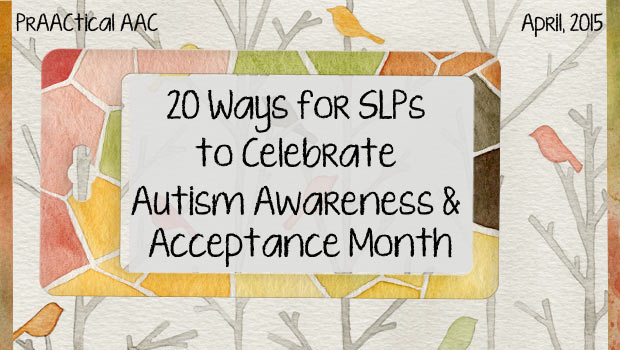
As SLPs, we know a good deal about autism spectrum disorders. Nevertheless, there’s always some new area to explore. Here are some ideas. Learn about and from self-advocates with ASD. Get inspired to learn more about video modeling and self modeling. Enroll in a MOOC (Massive Open Online Course) on Autism, like this one by Swinburne University of Technology. Learn more about what makes a narrative a social story as opposed to something else by reviewing the guidelines for sentence types. Take a ‘real look’ at a speech-language therapy session where the focus is coaching a family member to build play and interaction skills. Learn more about the neurodiversity and the neurodiversity movement. Share some of the empirical supports for AAC use. Learn more about DSM 5. Take a ‘real look’ at a family whose child has Down Syndrome and autism. Renew your commitment to theoretically sound and empirically supported... [Read More...]
December 9, 2014
by Carole Zangari -
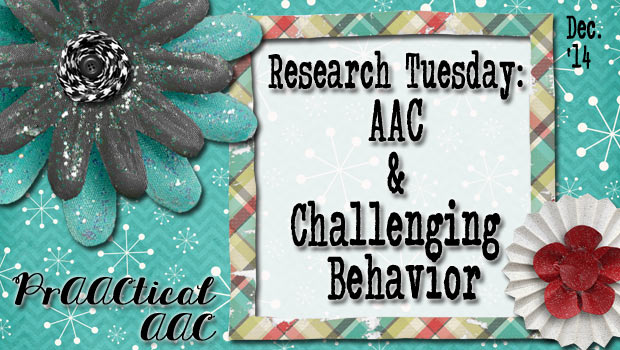
Research reviews are helpful tools for SLPs looking to implement evidence-based practices in their clinical work. In this month’s Research Tuesday post, we look at the work of Drs. Virginia Walker and Martha Snell, who conducted a meta-analysis to look at the relationship between challenging behaviors and AAC interventions. They looked at 54 different research studies with a total of 111 children and adults with AAC needs. They conducted both analytical and descriptive analyses. The research studies included participants at the emerging, prelinguistic, and multi-word levels of communication. Challenging behaviors were codes as distracting, disruptive, and/or destructive. Effect sizes were calculated using the Non-overlap of All Pairs method. Among their findings: AAC interventions reduce challenging behavior across a wide range of participants, including children and adults with a variety of developmental disabilities. AAC interventions were more effective with children (12 and under) than they were with adults (18 years and... [Read More...]
September 5, 2014
by Carole Zangari -
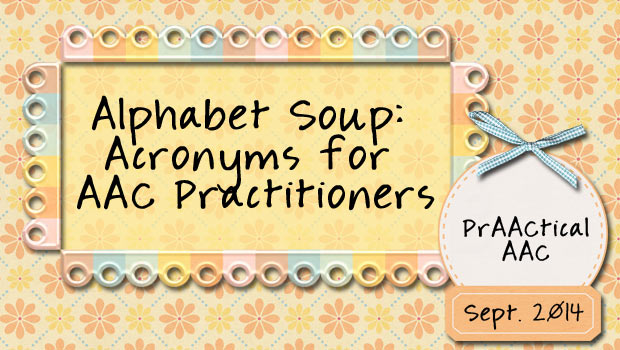
We’re excited about the passion and enthusiasm for AAC shown by many new SLPs and graduate student clinicians. One of the things they sometimes struggle with in reading and writing reports is the number of acronyms that we tend to use. This is always a problem in clinical and scholarly writing, but when the field is incredibly diverse and transdisciplinary, the challenges multiply. Here’s a starter list of acronyms* and their meanings. Many, MANY thanks to those who helped us create this list on the PrAACtical AAC Facebook page. AAC-RERC – AAC Rehabilitation Engineering Research Center ACOLUG – Augmentative Communication Online Users’ Group AiLS, ALgS, and ALs – Aided language stimulation ALI – Aided language input ALS – Amyotrophic lateral sclerosis AOTA – American Occupational Therapy Association APTA – American Physical Therapy Association ASD – Autism spectrum disorder ASHA – American Speech Language Hearing Association AT – Assistive technology ATIA... [Read More...]
August 28, 2014
by Carole Zangari -
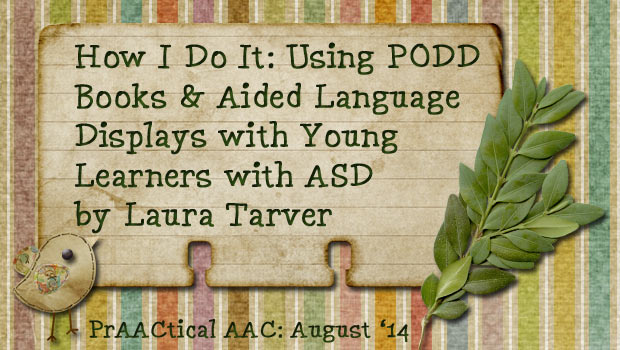
Today, we turn to the UK in a guest post by Laura Tarver. a London-based Speech and Language Therapist working with children with ASD and other complex needs. She previously worked in a primary school for children with ASD, where PODD and Aided Language Displays were introduced as part of a school wide approach in order to enhance the communication-friendly environment for all pupils. In this post, she shares how they used PODD books and aided language input to build the students’ communication skills. :::::::::::::::::::::::::::::::::::::::::::::::::::::::::::::::::: PODD (or Pragmatic Organisation Dynamic Display) communication books were developed in Australia by Gayle Porter, originally for children with cerebral palsy. As their use becomes more widespread throughout the world, practitioners are considering the benefits of using them with other clinical populations. Their structured organisation and emphasis on visual communication means that they are also a valuable tool for developing the communication of those with... [Read More...]
August 12, 2014
by Carole Zangari -
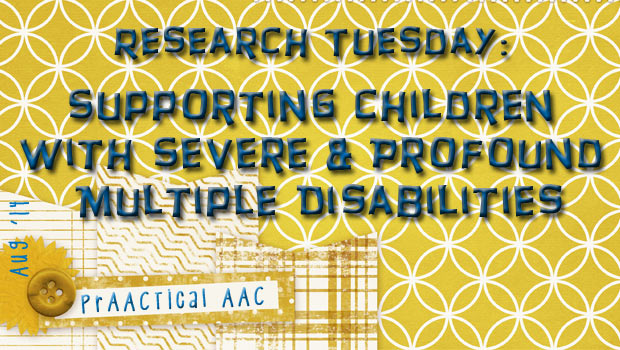
What do we know about the best ways to provide communication support to individuals with severe and profound multiple disabilities (PMLD)? PMLD is a term that generally refers to people who experience profound cognitive limitations in addition to sensory and/or physical disabilities. Many of these individuals have complex medical histories and chronic health concerns. Often, the communication difficulties experienced by individuals with PMLD cause them to be isolated and excluded from many social and educational opportunities. Despite their many challenges, there is evidence to suggest that AAC supports can help these children develop their communication skills. Not much is known, however, about how to structure the AAC intervention to maximize learning. In this study, Harding and her colleagues sought to reduce isolation and promote personal autonomy by providing AAC supports to two children with PMLD. As other researchers have demonstrated the positive impact of AAC on people with PMLD, this... [Read More...]
July 8, 2014
by Carole Zangari -
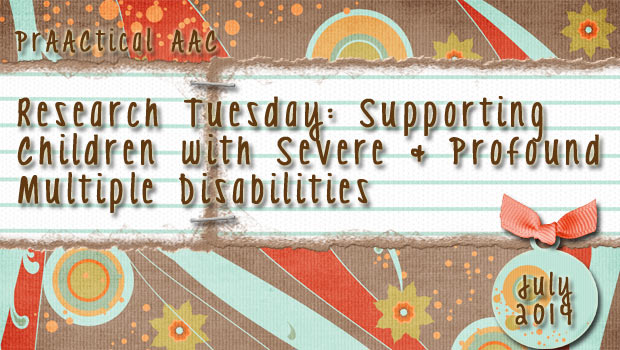
What do we know about the best ways to provide communication support to individuals with severe and profound multiple disabilities (PMLD)? PMLD is a term that generally refers to people who experience profound cognitive limitations in addition to sensory and/or physical disabilities. Many of these individuals have complex medical histories and chronic health concerns. Often, the communication difficulties experienced by individuals with PMLD cause them to be isolated and excluded from many social and educational opportunities. Despite their many challenges, there is evidence to suggest that AAC supports can help these children develop their communication skills. Not much is known, however, about how to structure the AAC intervention to maximize learning. In this study, Harding and her colleagues sought to reduce isolation and promote personal autonomy by providing AAC supports to two children with PMLD. As other researchers have demonstrated the positive impact of AAC on people with PMLD,... [Read More...]









